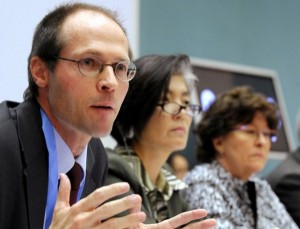swissinfo.ch | 1 November 2010

by Simon Bradley
Surging global food prices and volatility can largely be explained by market speculators, the United Nations expert on the right to food told swissinfo.ch.
Olivier de Schutter said it was too early to say whether recent price hikes signalled a world food crisis similar to that of 2008. But faster action was needed to curb price volatility and tackle related phenomena like land-grabbing.
Deadly riots over food prices hit Mozambique recently, and experts at a special UN Food and Agriculture Organization (FAO) meeting in September said unexpected price hikes “were a major threat to food security”. It issued a report showing that international wheat prices had soared 60-80 per cent since July while maize spiked about 40 per cent.
As a result of food price rises, countries from the Middle East, China and elsewhere are investing heavily in farmland in places like Africa to secure supplies. According to the World Bank, 45 million hectares were negotiated in 2009 – up from four million between 2006-2008.
swissinfo.ch: Are we on the brink of another food price crisis?
Olivier de Schutter: It’s too early to say. The price increases are very worrying and will be especially harmful for poor food importing countries which have developed an increased dependency on the international markets over the past 15 years.
What is paradoxical is that since 2008, food stocks have been replenished and the 2010 harvests are historically among the best ever, despite the fires in Russia, droughts in Ukraine and floods in Pakistan.
Prices of wheat, maize and rice have increased very significantly over the past few months but this is not linked to low stock levels or harvests, but rather to traders reacting to information and speculating on the markets.
swissinfo.ch: What kinds of speculative investors are you talking about?
O.d.S.: There is speculation by financial investors on markets for derivatives who buy in advance the right to buy or sell at pre-defined prices and who may be tempted to speculate on price increases by buying in advance lots of options, sending a signal to market operators that the prices are expected to continue to increase. This then becomes a self-fulfilling prophesy.
A second type of speculation, which may be the result of the first, is hoarding. This can spiral out of control as a bubble is created on derivatives markets and traders on the physical markets react to this bubble which they see as a signal that prices will continue to increase. This is the perfect storm we saw in spring 2008 which may be repeating itself – I hope not, but I fear it might be.
Over the past ten years the derivatives markets have become completely impossible to read and are not useful as a hedge against risk or as a price discovery mechanism.
They have been distorted by the arrival of very large financial investors who are not interested in stock levels or supply and demand curves but simply choose to invest in agricultural commodities as a portfolio decision like they do with petrol or minerals.
swissinfo.ch: What should be done to curb food price volatility?
O.d.S.: Speculators thrive on uncertainty, so the first thing to do is to provide more transparency and information about existing stocks. If countries could agree to share information on the stock levels they hold – many states have strategic reserves – that would be a disincentive for speculators.
Another option is to limit the number of positions any one financial investor can hold on any particular commodity.
Another is to ensure greater visibility of operations on the derivatives markets. In the European Union 92 per cent of derivative exchanges are completely non-transparent and are not possible to regulate. The European Commission intends to change this. I think we are moving in the right direction but it could be faster.
swissinfo.ch: How concerned are you by land-grabbing?
O.d.S.: I’m very concerned, as this is occurring in addition to the fact that available farmland is shrinking due to land degradation and urban and industrial development.
Giving away land to investors for large-scale plantations which create little employment and don’t contribute significantly to local food security is extremely problematic.
swissinfo.ch: Switzerland is among the states and organisations supporting codes of conduct to regulate contracts between foreign investors and host countries. Are they the solution?
O.d.S.: It’s a very paradoxical situation, as what comes closest to a code of conduct are the seven principles for “responsible agricultural investment” recently presented by the World Bank and UN agencies.
But these are contested on very different grounds. On the one side countries like China, the Gulf States and South Korea, which buy land abroad to achieve food security at home, or the target countries, especially in sub-Saharan Africa, say the principles were adopted without consultation and don’t want a top-down imposition.
But NGOs and farming organisations say they will legitimise what is in principle unacceptable – land going to rich investors instead of poor farmers.
I never thought it was a good idea to endorse the World Bank proposal, nor can we just ignore the phenomenon; we need to do something. I recently advocated discussing land deals within the UN Committee on World Food Security, which is a far more inclusive body.
Agricultural investment should not be seen simply as the development of large-scale plantations but primarily as investment in things like storage facilities, communication routes and building farming cooperatives.
If we really invest in small-scale farming, I believe it can have a tremendously positive impact on incomes and rural development and can slow migration to the cities.












